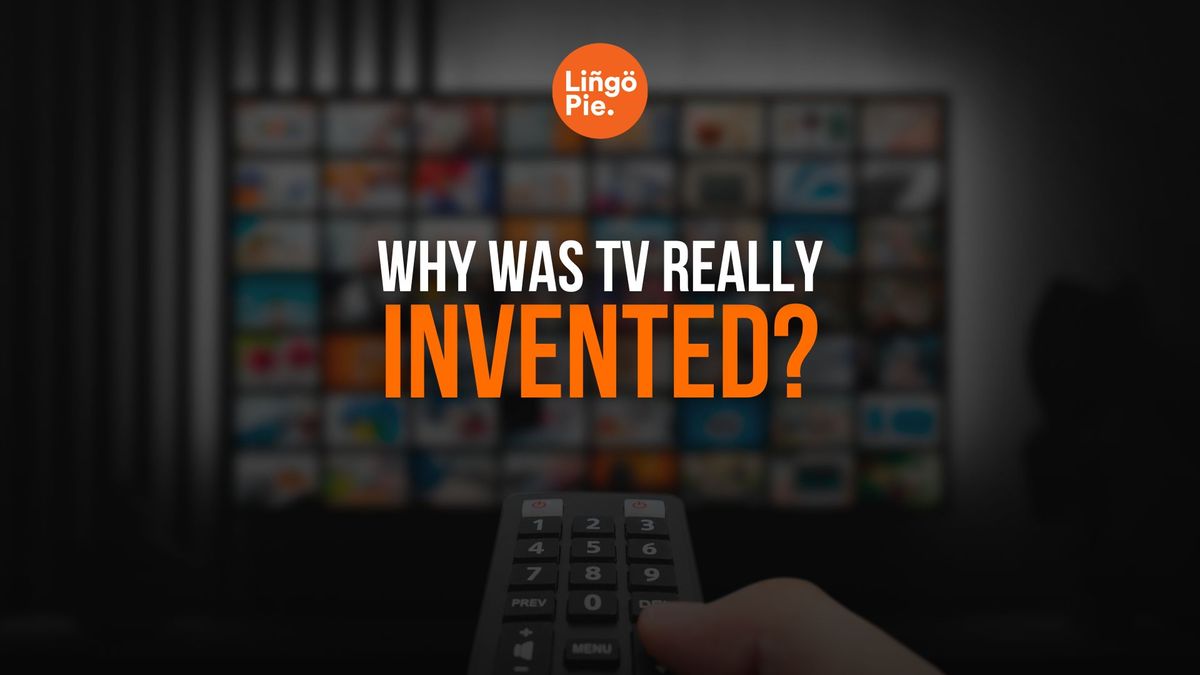The 21st of November marks World Television Day: a time to commemorate our love affair with TV and the many benefits it’s brought to our lives over the decades. Below, we dig a bit deeper to answer the question ‘why is World Television Day celebrated?’ and find out the real reason that TV was developed in the first place. Let’s start at the very beginning...
- Why Do You Sound Different In a Foreign Language?
- 8 Best Chrome Extensions for Language Learning [Guide]
- Best Language Learning Programs: Tools That Get Results

When Was TV Invented?
The very first TV was invented by Philo Taylor Farnsworth in 1927. Until the age of fourteen, Farnsworth lived in a home without electricity, and his original idea for a TV-like device was to create moving images using radio waves.
He went on to build the world’s first electronic TV that used moving electrons and famously transmitted the image of a dollar sign using the device after critics asked when they would start seeing money come out of his invention.

When Was Color TV Invented?
This is a contentious question, with various differing claims made regarding when this happened and who was responsible for it, with some suggesting that color television prototypes were first seen in the early 1900s...
But what we do know for sure is that color TV transmissions began in the 1950s, although the quality was initially much poorer than its black and white counterpart, and that the 1960s to 1980s saw an increasing shift away from black and white viewing as more people made the switch in response to better visual quality.
When Was the First Transatlantic Broadcast?
The first transatlantic television signal was broadcast in 1928 by the Baird Television Development Company between London and New York, but the first official transatlantic broadcast occurred in July 1962 when viewers in the UK were able to view pictures beamed from the US via the Telstar satellite.
Millions of viewers around the globe tuned in to watch for the two and half hour duration of the program, which included creative artists from nineteen different nations. Highlights included segments featuring The Beatles and Maria Callas, and Pablo Picasso.
The entire broadcast was entirely live, and no politicians or heads of state were allowed to be involved in the program, which required the input of ten thousand producers, interpreters, and technicians and attracted the highest viewing figures ever recorded up to that date.

Why Was TV Invented?
Now that we’ve answered the question, ‘when was TV invented?’ We need to know what were some of the driving forces behind its creation and development.
The radio, which came before it, was already providing entertainment and information to many households around the world, and taking the next step forward, of incorporating moving images, was perhaps a natural and logical one.
Radio programs were often viewed as a social opportunity: a time for family and friends to come together to listen. It has been suggested that the development of television could have partly been as a way to create similar opportunities in the home.
Of course, other forms of speculation are rife, too. There is a sizable contingent that believes that the development of TV was part of a plan by the government to manipulate and brainwash the general public.
Military and Strategic Origins of Television
What many people don't realize is that television's development was significantly shaped by military interests and wartime innovation. During World War II, the military saw huge potential in television. Imagine being able to see enemy movements without risking soldiers' lives. They quickly put TV cameras on aircraft, creating what we'd now call the first military drones.
The military poured massive resources into making TV better and more reliable. Between 1942 and 1945, they invested what would be about $100 million in today's money. This funding led to breakthroughs that would later make their way into our homes:
- Better cameras that could work in low light
- Clearer picture quality
- More reliable transmission
- Portable broadcasting equipment
RCA, which later became a household name in television, worked closely with the military during this time. Many of the improvements they developed for wartime use - like better picture tubes and clearer signals - ended up in the first TV sets sold to the public.
How We Use TV Now
Whatever the background of TV, in terms of its invention and intended use, it has developed into a medium that has brought us a vast array of opportunities and benefits.
Here are some of the ways that we make use of TV in our daily lives today:
Endless Entertainment
Let’s start with the one thing that hasn’t changed: how much we love to be entertained by our TVs!
From the first televised drama ever broadcast, ‘The Queen’s Messenger’ in September 1928, we’ve been hooked. Now, whether it’s watching blockbuster movies or binging on boxsets, our TVs are our best friends when it comes to good old-fashioned household entertainment.
Keeping Us Informed
Television is a key part of staying up to date with both local and world events.
Regional and national news stations offer an unbiased (in theory) account of what’s going on out there, and the increase in the availability of a multitude of channels has allowed us more access to news networks across the world than ever before.
Watching events unfold live can also be an important part of TV’s function in terms of keeping us informed and can be a way of disseminating important information.
Sometimes, in terms of a potentially hazardous situation, such as a heatwave or possible flood, even safety information can be effectively relayed to the general public via TV announcements; in the case of a crisis, turning on the TV is often one of the first things that people will think to do.
Limitless Learning
Education is one of the key ways that we now use our TVs.
From specially made programs to support learning in preschool children to opportunities to master a new skill in later life, TV provides endless ways to promote and enhance the taking on board of new knowledge.
And if you’re wondering, ‘can I learn a language by watching the tv?’ then the answer is a resounding, yes, you can!
Watching subtitled TV in the target language is a great way to help get you talking and understanding the lingo, possibly much faster than you thought was possible, especially when used in tandem with other immersive learning techniques.
One such tool is Lingopie, which turns your favorite TV shows into a fun and effective language learning experience. By providing real-time interactive subtitles in the target language, Lingopie allows users to immerse themselves in the content while picking up new words and phrases in context. This not only enriches the viewing experience but also boosts language retention. Watching TV shows with english subtitles and also in your target language is a great way to help get you talking and understanding the lingo, possibly much faster than you thought was possible, especially when used in tandem with other immersive learning techniques.
Related:


TV is really useful for picking up household and DIY skills, too: cooking programs and series on interior design can show us how to feed our families on a budget, or how to reupholster a chair; the sort of skills that can be learned in this fashion can result in big savings and more sustainable everyday practices.
TV programs regularly support distance learning studies in a wide range of subjects, too, from the history of art to advanced maths.
So if you want to find out how best to paint a watercolor portrait or to learn Spanish by watching tv, then the world is your oyster!
To Promote Social Change
One of the most influential drivers behind climate awareness - as a real thing, rather than as an abstract eventuality - was the David Attenborough documentaries concerning the effect of industry and man-made emissions on the environment.
For many people, actually seeing unimaginably vast slabs of ice fall into the ocean and polar bears emaciated due to the deterioration of their natural environment and subsequent inability to hunt for food did more to promote awareness than anything else that had gone before it.
These programs are largely credited with driving change on a global scale and changing both individual patterns of behavior and governments’ response to the situation.
It may not have been what TV was originally invented for, but it’s possibly its most important application and one that will continue to be an important part of general social awareness.
Cultural Exposure
It’s not necessarily practical to travel the world to immerse ourselves in different cultures, but TV can at least give us some vital exposure to and information on all of the countries of the world and the people that reside in them.
Distraction and Stress Relief

The capacity of TV to relieve stress, provide a much-needed temporary escape, or to fill some time when we’re feeling a little lonely or down can’t be underestimated, either.
Psychologists term TV’s ability to make us feel less alone as ‘social surrogacy,’ and the benefits of this can make a real difference, especially to those living alone.
Recent research has even found a connection between TV watching and a reduction in viewers’ cortisol levels; cortisol is known as the ‘stress hormone’, and its regulation is vital to our overall well being.
Shows that make us laugh have also been found to improve our overall state of mind while, interestingly, the University of Rochester recently discovered, in the course of a study, that viewers who were shown nature scenes felt more energetic afterward!
How Television Uses Us
There is, however, a payoff.
Most TV stations are funded by advertising revenue, which is why we have to put up with ad breaks part-way through an episode of our favorite series.
Television advertising has proved to be a highly effective way to boost brand awareness and promote consumer spending. It’s proved to be so productive that advertising tobacco products have been banned in several countries, as has advertising aimed at children before the watershed.
The History of World Television Day
World Television Day was first marked in 1996, having been declared by the United Nations general assembly, and has been celebrated annually on November 21st ever since.
The decision to honor TV with its own special day was based on television’s capacity to entertain, inform, educate, and its capacity to influence our opinions and decisions.
The decision to have a day dedicated to television came about as a result of the world’s first global Television Forum that was held by the UN earlier in the same year.
The UN had realized the potential of TV to inform the public of events that were unfolding on the global stage and the fact that it could be used as a tool to raise awareness, inform opinions, and promote action.
For the UN, television remains an important way to reach a wide audience and raise awareness about global events. A suite of products and services is available from the organization, which covers its work as well as supporting international news media provision.
UN meetings and events can also be viewed via a live streaming service, and the organization produces videos for use by social media and news platforms.
What Are Considered the Best TV Series Ever Made?
According to the IMDB, the best TV shows of all time are:
- Planet Earth 1 and 2. These documentaries aired in 2006 and 2016, respectively, and both their captivating visuals and important message about the beauty and fragility of our world were, and remain, extremely powerful.
- Band of Brothers. This poignant war documentary broadcast its first episode in 2001 and focused on a single regiment from 1942 up until the end of the war.
- Breaking Bad. This broke viewing figures as well as bad. Everyone was talking about this series which first aired in 2008, and its portrayal of a chemistry teacher who goes seriously off the rails following a cancer diagnosis.
- Chernobyl. This miniseries from 2019 focused on the disaster of 1986 and the cleanup operations that happened in its wake.
Ideas For Activities On World Television Day
If you need an excuse for a binge, then celebrating World Television Day is the perfect one to call upon! Or consider taking the opportunity to throw a themed evening and have friends over and dress as your favorite characters from a TV show.
Watch your all-time favorite episodes, and then round off the evening with a TV-themed quiz.
If you’ve got kids, how about marking World Television by viewing a vintage black and white TV program and then eating dinner at a table set with items from the 1950s, a time when an increasing number of homes were buying their first-ever television set: you could include things like coins from that decade, photographs, and 50s style costume jewelry.
And after all that fun? You might need a day of box-set binging.
Frequently Asked Questions
Who really invented the first TV?
While Philo Farnsworth is credited with inventing the first fully functional and complete electronic television system in 1927, several inventors including John Logie Baird, Charles Francis Jenkins, and Vladimir Zworykin all made crucial contributions to television's development between 1923 and 1929. Farnsworth's system was revolutionary because it was the first to capture, transmit, and receive moving images using purely electronic technology.
When did most homes get TV?
Television ownership in American homes exploded during the 1950s, with the percentage of households owning a TV jumping from just 9% in 1950 to an impressive 87% by 1960. This massive increase was driven by lower prices, the post-war economic boom, and the introduction of popular programming like "I Love Lucy" and "The Ed Sullivan Show."
How much did the first TV cost?
The first commercially available television sets in the late 1940s cost between $200 and $600 (equivalent to $2,400 to $7,200 in today's money). RCA's first mass-produced television set, the TRK-12, was released in 1939 at $600 and featured a 12-inch screen, making TV ownership a luxury that only wealthy families could initially afford.
What was the first TV show ever broadcast?
"The Queen's Messenger," broadcast by WGY in Schenectady, New York on September 11, 1928, was the first dramatic television program ever broadcast. The 40-minute live drama used just three characters and required four cameras, making it a groundbreaking achievement in television history despite its simple production.
Why did TV become black and white before color?
Black and white TV dominated early television because color broadcasting technology was significantly more complex and expensive to develop. While color TV was first demonstrated in 1940, the technology wasn't perfected until the 1950s, and color sets remained too expensive for most consumers until the mid-1960s. The simpler black-and-white technology allowed TV to become widely adopted while color systems were being refined.







![5 Official Spanish Language Tests To Show Your Proficiency Level [Guide]](/blog/content/images/size/w300/2025/06/Spanish-Language-Tests.jpg)
![Why Memorizing Spanish Words Won’t Make You Fluent [Tips]](/blog/content/images/size/w300/2025/06/how-to-practice-spanish-vocabulary.jpg)
![How to Improve Your Polish Conversation Skills [5 Best Tips]](/blog/content/images/size/w300/2025/06/improve-polish-conversation-skills.jpg)
